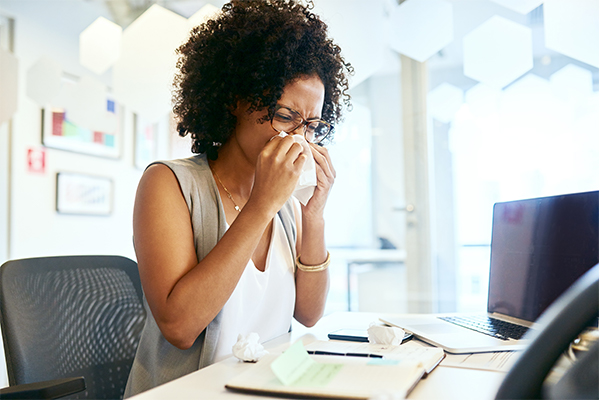How to Protect Your Office From the Coronavirus and Other Diseases
February 5, 2020 | AUTHOR: Office Pride
The rapid spread of the coronavirus first identified in China in December is leading every newscast these days, causing some alarm among people who wonder how they can keep themselves, their families and co-workers healthy.
Like the flu, coronavirus is a respiratory virus that can cause serious infection. For most people living in the U.S., the same precautions recommended to protect against the flu are recommended for coronavirus – with the exception of getting a vaccine.
Additionally, the good news about coronaviruses – this new strain is part of a broad family of viruses – is that certain disinfectants can easily kill the viruses on surfaces. Those disinfectants are available to healthcare workers and commercial cleaners like Office Pride Commercial Cleaning Services.
What is the history of coronavirus?
Coronavirus is a family of viruses named for the crown-like spikes on their surface. They generally cause mild to moderate upper-respiratory disease in people but can also lead to more severe infections, such as pneumonia. SARS – or Severe Acute Respiratory Syndrome, first reported in 2003 – is another coronavirus.
The particular strain of coronavirus that is causing the current outbreak was first identified among people in Wuhan City, Hubei Province, China. Most of the people first affected in Wuhan City have been linked to a wholesale fish and live animal market there. More recent cases, with no link to animal markets, suggest the virus is spreading from person-to-person, possibly starting whenever travelers who visited the markets then traveled to other areas.
Many coronaviruses are believed to have started in animals and then transmitted to humans, including the Wuhan strain and SARS. Infected animals rarely show any symptoms of the disease, but coronaviruses also are likely to be found in contaminated feed, water or soil near contaminated animals. Therefore, workers in at-risk areas who handle livestock or dead animals are advised to take additional precautions, as are healthcare workers and others who anticipate coming in contact with people who recently returned from China.
How can I protect myself from coronavirus?
Because the coronavirus first was identified in December, no vaccine against it has yet been developed. The best way to prevent getting the virus is to avoid exposure.
As with all respiratory viruses, the Centers for Disease Control and Prevention (CDC) recommends frequent, thorough hand washing or alcohol-based hand sanitizer; avoiding touching your eyes, nose and mouth; avoiding close contact with sick people; staying home when you are sick; covering your cough or sneeze with a tissue and safely discarding the tissue; and regular cleaning and disinfection of frequently touched objects or surfaces.
Generally speaking, coronaviruses can live on surfaces from a few hours to a few days. Although researchers are still learning about the Wuhan strain, there are a number of Environmental Protection Agency-registered, hospital-grade disinfectants on the market that have proven effective against emerging viral pathogens such as coronaviruses. Those disinfectants also help protect patients in healthcare settings against viruses like tuberculosis, MRSA and Norovirus, and professional cleaners like those employed by Office Pride franchise locations are trained to use them correctly and safely.
Finally, the CDC has advised travelers to temporarily avoid nonessential travel to China. As a precaution, Americans who have been airlifted from China are being quarantined on military bases until the incubation period (up to 14 days) passes to avoid further spread of the virus.
What are the symptoms of coronavirus?
Unfortunately, the symptoms of coronavirus strongly resemble the symptoms of the flu, and of course, this is the height of flu season.
The symptoms of coronavirus are fever, cough, difficulty breathing and shortness of breath. At the time of this writing, the CDC reports that it is unclear how easily the virus may be transmitted from one person to another, but previously identified coronaviruses were transmitted through close personal contact or via droplet transmission (such as coughing or sneezing).
If you may have been exposed to the coronavirus, call your healthcare provider immediately to find out how to be evaluated and/or treated.
Most people in the U.S. who develop flu-like symptoms are more likely to have the flu, which is also a very serious virus. If you or someone in your office tests positive for flu or any other serious virus, let your professional cleaner know so that he or she may use the appropriate disinfectants to prevent spreading the virus to other co-workers.
